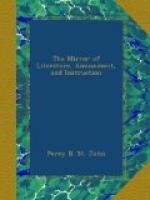The love that was borne for her, all over the hill-region and beyond its circling clouds, was almost such as mortal creatures might be thought to feel for some existence that had visibly come from heaven! Yet all who looked on her saw that she, like themselves, was mortal; and many an eye was wet, the heart wist not why, to hear such wisdom falling from her lips; for dimly did it prognosticate, that as short as bright would be her walk from the cradle to the grave. And thus for the “Holy Child” was their love elevated by awe, and saddened by pity—and as by herself she passed pensively by their dwellings, the same eyes that smiled on her presence, on her disappearance wept!
Not in vain for others—and for herself, oh! what great gain!—for these few years on earth, did that pure spirit ponder on the word of God! Other children became pious from their delight in her piety—–for she was simple as the simplest among them all, and walked with them hand in hand, nor spurned companionship with any one that was good. But all grew good by being with her—–and parents had but to whisper her name—and in a moment the passionate sob was hushed—–the lowering brow lighted—and the household in peace. Older hearts owned the power of the piety, so far surpassing their thoughts; and time-hardened sinners, it is said, when looking and listening to the “Holy Child,” knew the errors of their ways, and returned to the right path, as at a voice from heaven.
Bright was her seventh summer—the brightest, so the aged said, that had ever, in man’s memory, shone over Scotland. One long, still, sunny, blue day followed another; and in the rainless weather, though the dews kept green the hills, the song of the streams was low. But paler and paler, in sunlight and moonlight, became the sweet face that had been always pale; and the voice that had been always something mournful, breathed lower and sadder still from the too perfect whiteness of her breast. No need—no fear—–to tell her thai she was about to die! Sweet whispers had sung it to her in her sleep, and waking she knew it in the look of the piteous skies. But she spoke not to her parents of death more than she had often done—and never of her own. Only she seemed to love them with a more exceeding love—and was readier, even sometimes when no one was speaking, with a few drops of tears. Sometimes she disappeared—nor, when sought for, was found in the woods about the hut. And one day that mystery was cleared; for a shepherd saw her sitting by herself on a grassy mound in a nook of the small, solitary kirkyard, miles off among the hills, so lost in reading the Bible, that shadow or sound of his feet awoke her not; and, ignorant of his presence, she knelt down and prayed—for awhile weeping bitterly—but soon comforted by a heavenly calm—that her sins might be forgiven her!
One Sabbath evening, soon after, as she was sitting beside her parents, at the door of their hut, looking first for a long while on their faces, and then for a long while on the sky, though it was not yet the stated hour of worship, she suddenly knelt down, and leaning on their knees, with hands clasped more fervently than her wont, she broke forth into tremulous singing of that hymn, which from her lips they now never heard without unendurable tears.




